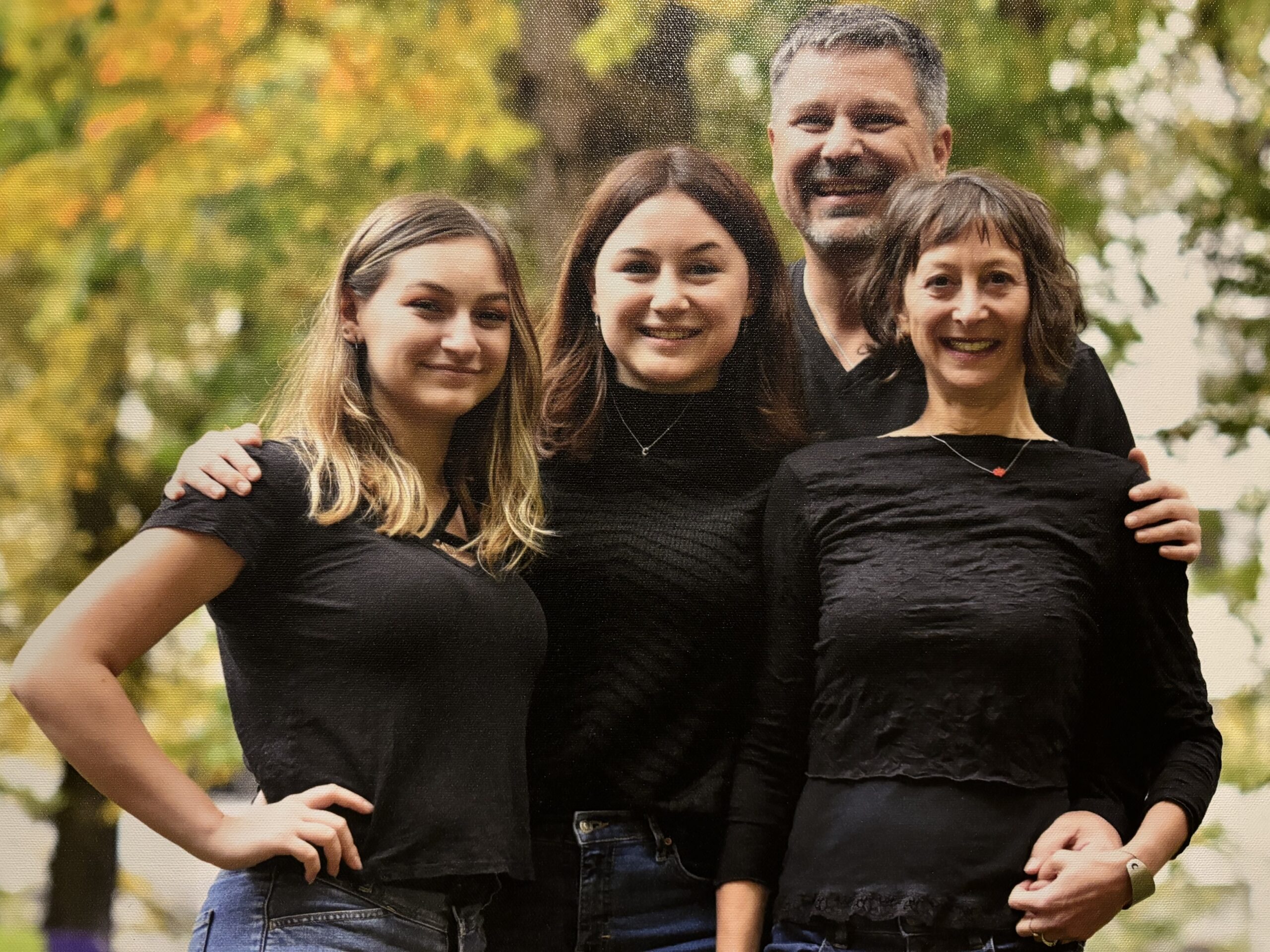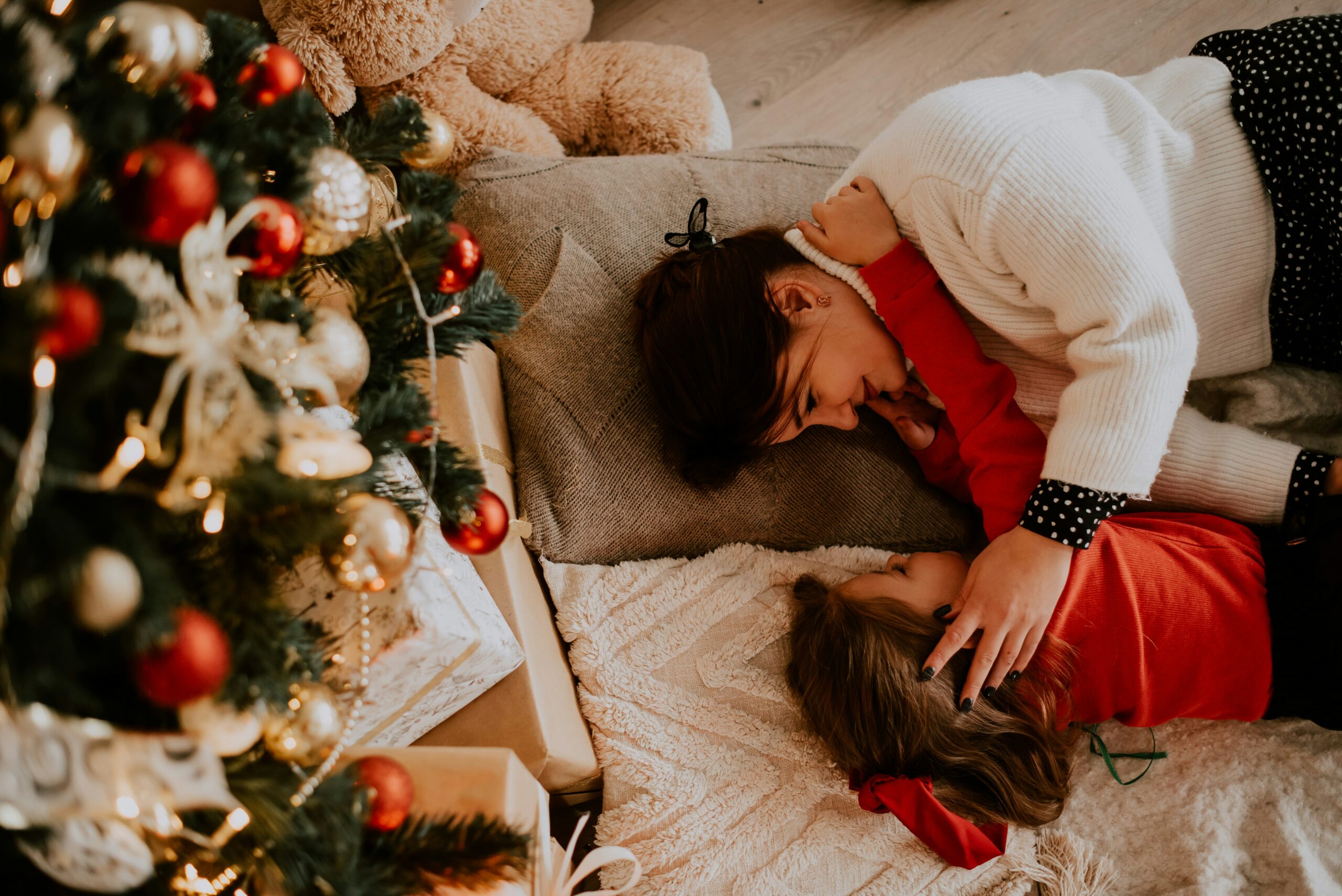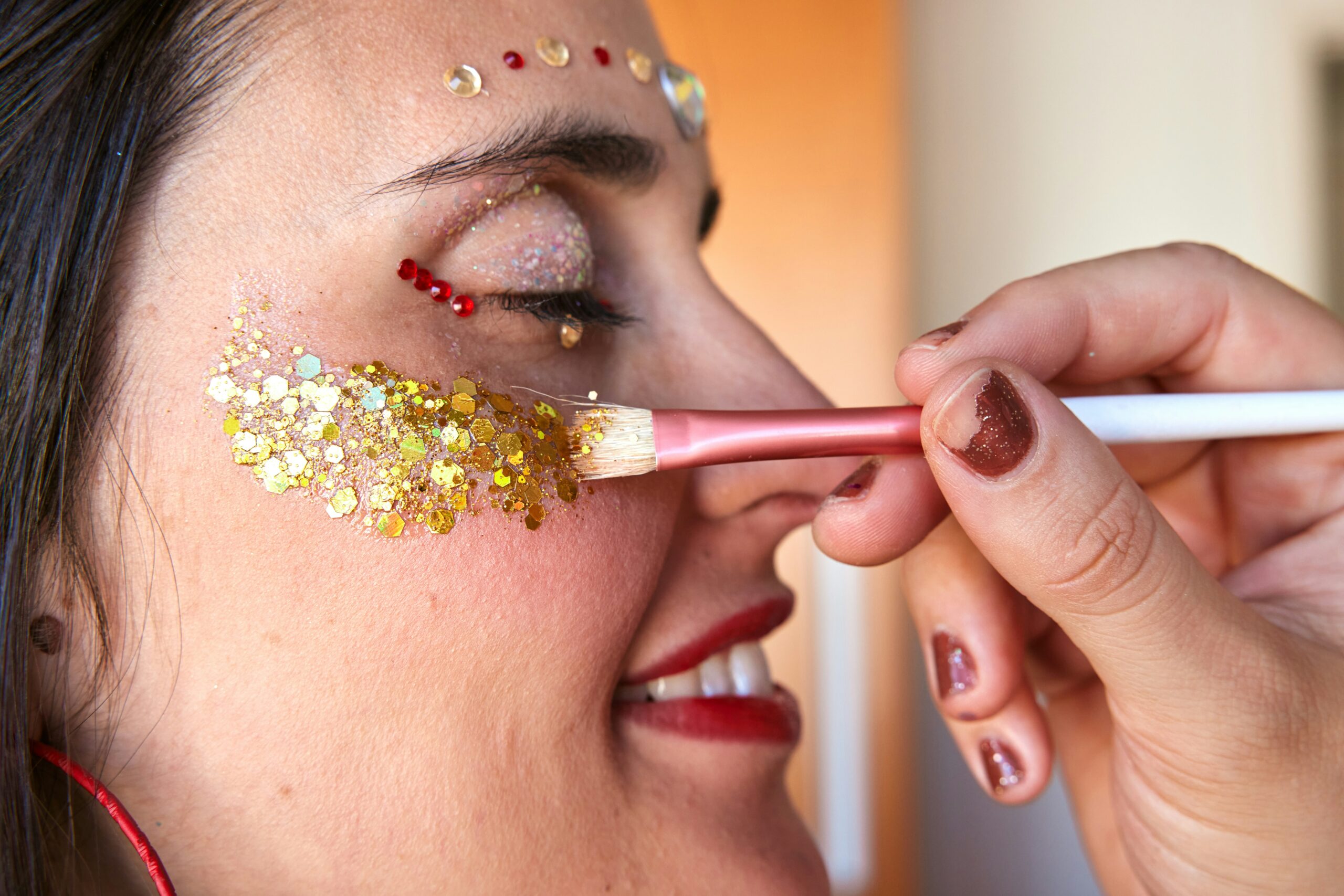Getting—and staying pregnant—at first was impossible. I took fertility drugs and underwent a few painful procedures to jump-start a system that self-starvation had ceased.
I blamed myself. Ever optimistic and kind, my husband Dave never did. He reminded me of some of our reassuring test results in our bid to become parents and that enjoying the process of baby-making should be just that: a joy. My doctors told me I had to gain weight to become a mom. Dave encouraged my new cookie-a-day routine to help us both realize a dream.
Eventually, and, I believed, miraculously, I successfully conceived our two daughters. A third pregnancy ended in the miscarriage of a baby we’d never know. Today our girls are 21 and 23, healthy, beautiful and kind. I still worry my behavior in their early years caused them harm.
When Hayley was an infant and Alyssa was 2 years old, and I in my early 30s, my bargain with God—to never again engage in anorexic thought or behavior if Dave and I could have our own children—fizzled. Stress from recovering from pregnancy bed rest, being a stay-at-home mom with two very busy and demanding children—and less time to work out and shed pregnancy pounds sparked my old college habit of trying to control what I should (or could) not.
My two pregnancies were successful—but also terrifying. They had awful similarities: I continued to bleed into my second trimester, and once the bleeding stopped, the Braxton-Hicks contractions began, as early as week 18 with our second daughter. On a few occasions—usually in the still and dark of the middle of the night—I said tearful goodbyes to our babies, assuming and fearing another miscarriage.
Like my initial inability to successfully conceive, I blamed myself for my pregnancy complications. It was my fault that my hyperfocus on self-starvation had starved my body of the ability to have a baby of our own, to become a mom.
Determined to do all I could to see my shaky pregnancies through, I began actively gaining weight once morning sickness mercifully came to an end. Bed rest and its forced inability to exercise helped, and I simply ate more, giving in very willingly to my cravings (buttery grilled cheese with tomatoes, please) and appetite (ice cream for breakfast, yes indeed). My doctor complimented me on my appropriate weight gain. Approval-seeking, I felt amazing: I was putting on pounds like a good girl.
I believed my anorexia was cured…
…Until later in the pregnancies when the inevitable bed rest-induced muscle atrophy and sagging thighs and butt set in. To counter this out-of-control weight gain, I vowed to return to my pre-pregnancy running routine and—once my babies no longer were dependent on my body to live or for nourishment—starve myself like I did so well back in college.

During my freshman year at UC-Santa Barbara, I lost about 30 pounds and, at 19, my period stopped. I thought primarily about food: when and what I would allow myself to eat. My initial goal of losing the “freshman 15” became a game of how little I could consume—and how few times a day—while still riding my bike to class, maintaining a 4.0 GPA and occasionally joining friends at a party.
Every night, I dreamed of food, especially the fattening stuff I’d ceased allowing myself: waffles, muffins, ice cream and pizza. No green foods appeared in my dreams, while actual meals were dominated by lettuce, Granny Smith apples and cucumbers.
The less I ate, the more aware I became of smells around me. One scent stands out from the others: eucalyptus. A native Oregonian, I arrived in Southern California a scared young adult, believing that constant sun would negate any doldrums and that ubiquitous eucalyptus trees must be native to the region.
Given their abundance, it was jarring to learn they’re native to Australia where toilets drain counterclockwise and are considered an invasive species in California. They, like I, were interlopers.
They successfully took root while I was trying to disappear.
The hungrier I felt and the more I hated my shrinking body the heavier the eucalyptus’ sweet scent. Soon, the odor became associated with hunger, as well as my thinning hair, desiccating skin and increasing isolation as I tried and failed to fling myself off the lonely hamster wheel of self-starvation.
With a toddler and a baby in tow and a post-pregnancy body to conquer, I again perceived my tummy spilling over my jeans, just like the body dysmorphia from which I suffered at UCSB. I returned to jogging before my body with atrophied bones had healed; I sustained a stress fracture in my right tibia that required six weeks in a boot cast.
As the girls got older, I began skipping meals. I once took them to Round Table Pizza, purposefully ordered nothing for myself and ate their scraps. I figured they were too young to notice. Dave certainly did—come dinnertime, I would be ravenous, irritable and impatient. My pants started to loosen.
I set my alarm to ring before sunrise so I could exercise in secret while the girls were still sleeping. I also began to project my own restricting behaviors onto them, keeping sweets like cookies and ice cream limited to specific days of the week and overly controlling their portions, getting upset when they’d consume a carb and not balance it with a vegetable. This behavior they recall. Yup, they were old enough to notice.
Dave gently reminded me I needed to eat more, especially now we had two girls whose healthy body images and eating habits we needed to engender. I worked very hard to eat in my daughters’ presence, not just watch them consume. I dislike hypocrisy, and I came to realize I’d become a hypocrite. I promoted body positivity out of one side of my mouth while putting too few calories into the other.
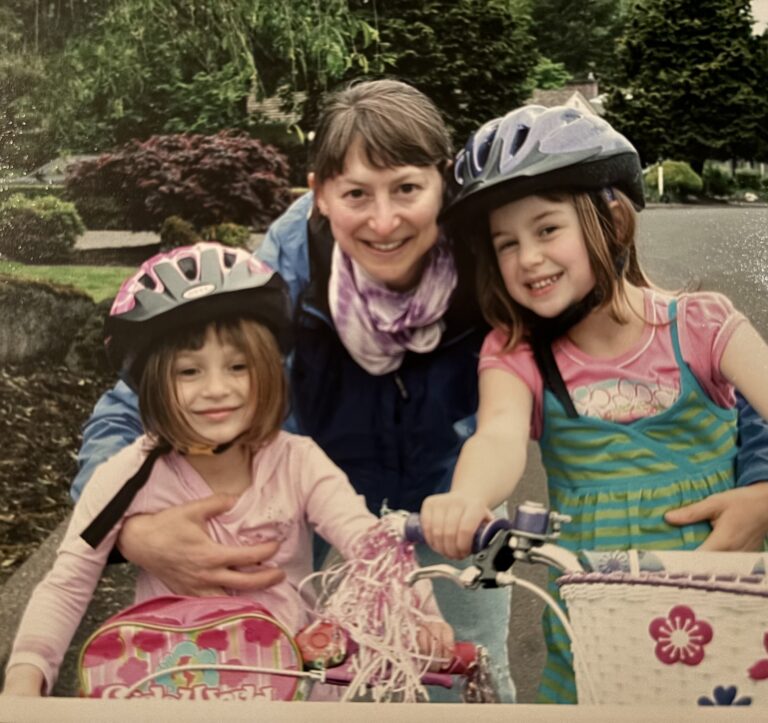
Both Dave and a therapist helped me see—and I slowly learned to recognize—that my default response to my baseline high-anxiety state was to impose control where there was none. Home could feel out of control: I often single-parented while Dave traveled for work. I supported one daughter with Asperger’s and another with OCD, and I spiraled over a messy kitchen and unvacuumed floors.
I remember the first day I finally decided to take an anti-anxiety medication: My world stopped spinning and I cared less about the girls running circles around one another and me, too. Slowing down helped loosen the knots in my stomach and soothe my anxiety as my pants tightened about my waist.
I stopped being chronically anemic, my nails and hair regained luster and my days of purposefully skipping meals came to an end. I also began to talk with my daughters about my battle with an eating disorder, answering all their questions, including the toughest of them.
The process took about three decades.
Over that time, I noticed the healthier I got, the more eucalyptus faded into the background, no longer seeming a permanent olfactory fixture.
But I’d never returned to UCSB’s campus, unlike my friends who proudly introduced their kids to their alma mater, turning Santa Barbara itself into a vacation destination. I couldn’t imagine traveling to a place redolent of eucalyptus, where, for years, I purposefully starved in a sunny, washed-out landscape.
Until I turned 50. Dave asked me what I wanted for my milestone birthday. At first, I said “nothing.” But then I began to reflect: What, indeed, did I really want? Eventually, it became clear: I wanted to go with Dave to Santa Barbara, no longer as a confused college kid but as a middle-aged adult woman for whom food is now fun, not fear. I wanted to spend time in town, tour campus, inhale its scents and feel unmoved, to bury the eating disorder demon in a eucalyptus grove and return to Portland unscathed, even entirely healed.
This trip took place shortly before our youngest daughter left for her first year in college; it coincided with the dawn of our empty-nest years. It had been 30 years since diagnosis with anorexia, 20 of them spent while actively mothering. It was time once and for all to be done.
While strolling campus’ once-familiar paths and stands of eucalyptus, I caught their faint scent and recalled but no longer could feel its grip. Dave, now gray-haired, stayed pretty quiet, but watched me out of the corner of his eye.
We ended the day in downtown Santa Barbara and walked into one of the many wine bars that now dot the city. No longer on a student budget nor afraid to revel in a glass of wine and fried snacks at 4 p.m., I took Dave’s hand, inhaled the local red and imbibed freedom. From self-hate and also of love.
Author
-
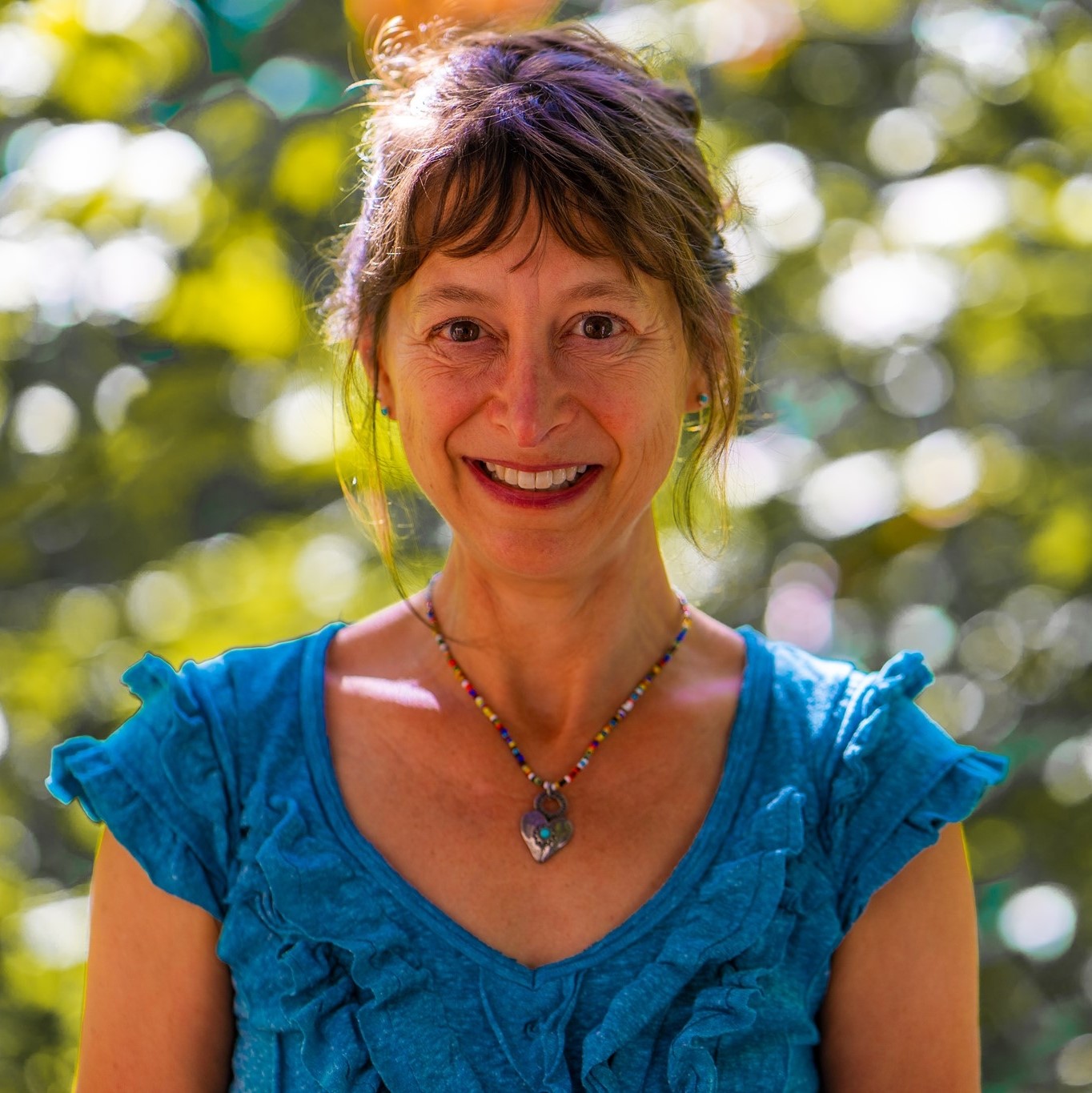
Jenn Director Knudsen divides her professional life into three timeframes: freelancer, mom, freelancer-mom. A self-described dinosaur (who still keeps a hand-written daily calendar), Jenn has written primarily for print newspapers, such as The Boston Globe, The Oregonian, the San Francisco Chronicle and The Forward, as well as several online publications, including HuffPost and Publishers Weekly. You will never find Jenn in the garden or watching football; instead, she loves jogging, family time, reading and watching (or, rather, reading) foreign films.
View all posts

